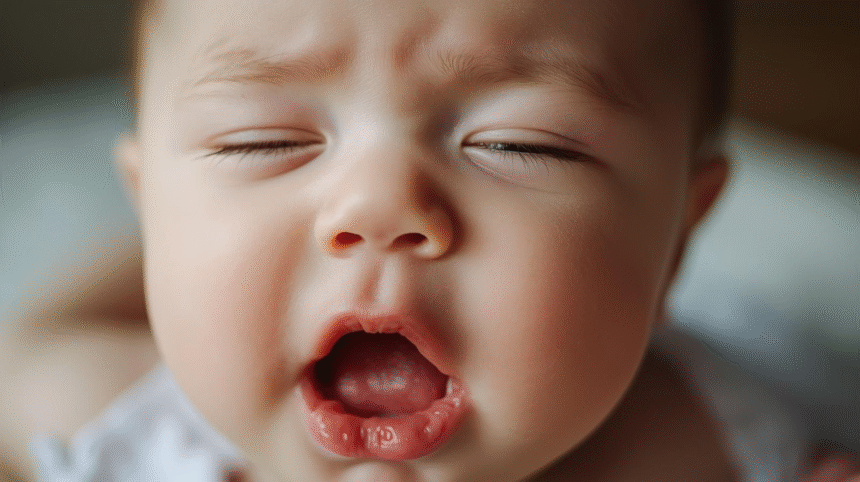New parents quickly learn that babies make a wide range of sounds—grunts, gurgles, sighs, and especially snorts. While these noises can be startling at first, most are completely normal. In fact, infant snorts are one of the most common sounds you’ll hear during the first few months of life.
Because a newborn’s nose and airway are still developing, even a small amount of mucus can lead to snorting or noisy breathing. Knowing the difference between normal baby noises and those that may require attention is key to keeping your baby comfortable and safe.
In this article, we’ll break down the causes of infant snorts, when they’re harmless, and what gentle solutions you can use at home—including using the best nasal aspirator for newborns to clear tiny nasal passages.
Understanding the Sounds: Why Your Baby Makes Noises
Newborns have small, delicate airways that can amplify even the slightest obstruction. Their breathing is also immature, and their nervous system is still learning to regulate patterns. That’s why you may hear snorts, squeaks, and other odd noises throughout the day and night.
- Babies are obligate nose breathers, which means they primarily breathe through their noses rather than their mouths. Any congestion will make their breathing sound noisy.
- Their tiny nasal passages can easily get clogged with dust, mucus, or even dried milk, leading to snorting.
- Newborns sometimes still carry residual amniotic fluid in their nasal passages, which clears during the first weeks of life.
So while these sounds might seem unusual, most of them are completely normal in the newborn stage.
The Main Reason: A Look at Your Baby’s Tiny Nose
Your baby’s nose is perfectly designed for their small size, but it’s also the reason they’re prone to noisy breathing. Their nostrils are narrow, their cartilage is soft, and their nasal passages haven’t fully matured. Even a thin layer of mucus can make it harder for air to pass smoothly, producing a snorting sound.
Because babies can’t blow their noses on their own, parents often need to step in with safe methods of clearing the airways. This is where gentle tools like saline drops and a nasal aspirator become very helpful.
Normal Noises: When a Snort Is Nothing to Worry About
It’s important to recognize that many infant snorts are harmless. A few common situations where snorting is completely normal include:
- During sleep transitions: Babies may grunt or snort while shifting between sleep stages, especially in REM sleep.
- While feeding: Milk can momentarily block nasal passages, causing a snort or snuffle.
- During digestion: The effort of processing food may make them grunt or breathe noisily.
In most cases, these sounds fade as babies grow and their airways strengthen—usually by 3–4 months. If your baby seems comfortable, is feeding well, and is gaining weight, occasional snorts are nothing to be concerned about.
The Common Culprits: Why Mucus and Irritants Get Stuck
Not all snorts are random; sometimes, they have clear triggers. Here are some common causes:
- Residual fluids: Amniotic fluid or milk can get caught in the nose or throat.
- Colds or minor infections: Even a simple cold can cause congestion and snorting.
- Dry air: Low humidity makes mucus thicker and harder to clear.
- Environmental irritants: Dust, smoke, strong perfumes, or pet dander can irritate tiny nasal passages.
- Reflux: Milk or stomach contents may back up, leading to snort-like sounds as the baby clears the airway.
Fortunately, most of these can be managed at home with the right care and environment.
Gentle Solutions: How to Soothe Your Baby’s Airways
When your baby sounds congested or snorty, simple remedies can bring relief. Here are the most effective and gentle methods:
- Saline drops: A few drops of saline solution in each nostril can help loosen mucus before suction.
- Nasal aspirator: Using the best nasal aspirator for newborns allows you to safely remove mucus without causing irritation. Options include bulb syringes, oral suction aspirators, and electric aspirators.
- Humidifier: A cool-mist humidifier in your baby’s room helps keep the air moist, making breathing easier.
- Steam therapy: Sitting with your baby in a steamy bathroom for a few minutes can temporarily clear nasal passages.
- Gentle positioning: Slightly elevating your baby’s head during sleep (following safe sleep guidelines) can help mucus drain more effectively.
Always use gentle techniques, as a newborn’s nose is very sensitive. Avoid overusing suction, which may irritate the nasal lining.
Clearing the Air: The Role of Humidity and Your Environment
Your home environment has a direct effect on how easily your baby breathes.
- Keep the air moist with a humidifier, especially in winter or in air-conditioned rooms.
- Clean regularly to minimize dust and allergens.
- Avoid smoke and strong fragrances, as they can inflame your baby’s sensitive nasal passages.
- Ensure proper ventilation to keep fresh air circulating.
These small adjustments can significantly reduce the frequency of infant snorts and keep your baby more comfortable day and night.
Beyond the Snort: When a Sound Could Signal Something Else
While most snorts are harmless, some noises may point to underlying issues. Contact your pediatrician if you notice:
- High-pitched wheezing or stridor
- Frequent pauses in breathing (longer than 10 seconds)
- Rapid breathing (more than 60 breaths per minute)
- Labored breathing with flaring nostrils or chest retractions
- Bluish lips or skin
- Persistent loud snoring or stridor during feeding or sleep
These signs may indicate conditions such as laryngomalacia, severe congestion, or respiratory infections that require medical attention.
Final Thoughts
Hearing your baby snort can be unsettling at first, but in most cases, it’s a normal part of newborn development. Their tiny nasal passages, sensitivity to environmental changes, and inability to clear mucus on their own make snorting a common sound during the early months.
With simple solutions—like using saline drops, maintaining proper humidity, and gently clearing their nose with the best nasal aspirator for newborns—you can help ease their breathing and keep them comfortable. Still, it’s important to stay attentive to signs of distress such as labored breathing, bluish lips, or prolonged pauses in breath, which may require medical care.







